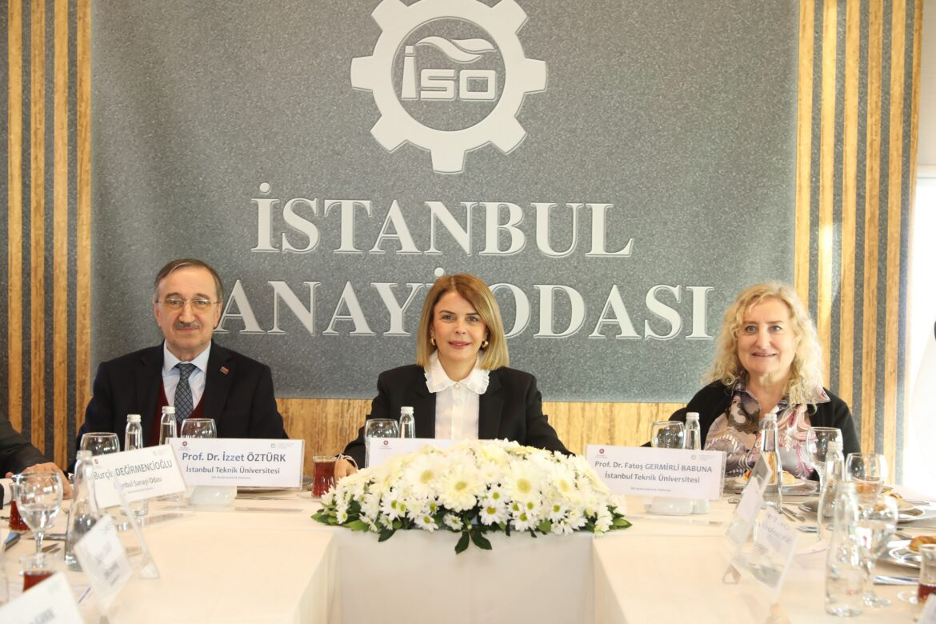ITU Academicians Have Corporations with Istanbul Chamber of Industry on Regional and National Water Security
As Istanbul Chamber of Industry, with the awareness of appreciating our natural resources, protecting them and our responsibility for a sustainable environment; We completed and announced the "Climate Change and Water Management: Industrial Sector Report" together with academicians who are experts in the field.
Honorary Member of the Turkish Academy of Sciences and one of the academicians of ITU Environmental Engineering Department, Prof. Dr. We hosted our Minister of Agriculture and Forestry, Mr. İbrahim Yumaklı, about the research conducted under the coordination of İzzet Öztürk; “By Increasing the Integration between Agriculture and Industry with a Visionary Perspective; Our statement at our May Assembly meeting titled "Evaluating the Agricultural Industry's More Effective and Efficient Contribution to Our Economy" became even more meaningful.
This scientific research tells us; It predicts that temperatures in our country will increase by 2.5°C to 5°C and the amount of precipitation will decrease by 10% to 20% in the next 50 years. Hydrological modeling studies predict that our water potential will decrease by 15 to 50 percent in the near future.
As for the solution, academics give us many suggestions. First of all, I would like to share a few of the industry-related ones here: Activating water saving methods in industrial production processes. In-plant water management, purification and reuse of wastewater, separation of usable dissolved elements. Development and dissemination of processes that collect water and do not create wastewater. In this way, the development of chemical, paper and textile industries that are less dependent on water…

Prof. Dr. İzzet Ozturk, National Water Security Expert, ITU Environmental Engineering Department
Our Rector Prof. Dr. İsmail Koyuncu Elected as IWA “Fellow”
The International Water Association (IWA), one of the most respectable institutions in the world in the field of water and wastewater, elected our Rector Prof. Dr. İsmail Koyuncu as a “Fellow”. Prof. Dr. İsmail Koyuncu’s “Fellow” membership reflects his outstanding contributions to the water sector and his commitment to advancing IWA’s strategic goals.
With this membership, our Rector will contribute to shaping the future of water management worldwide with sustainable water solutions by sharing knowledge with other members.
IWA Community of Fellows and Distinguished Fellows represents a global network of influential water professionals who exhibit outstanding leadership, innovation and dedication.

The Theme of the DIGIWATER Camp: Cybersecurity and Natural Catastrophes

Istanbul Innovation Camp, an initiative of the Erasmus+ project DIGIWATER, was held on March 15-17 on our Ayazağa Campus with the participation of six universities, six SMEs, and the umbrella organization EWA. An international students group and stakeholders from academia, public and industry came together to share and develop new applications of digital technologies in the water sector.
The focus of the Istanbul Innovation Camp, hosted İTÜ-MEMTEK and MEMSİS and led by our Rector Prof. Dr. İsmail Koyuncu was on the management of natural and man-made catastrophes in the water sector using digital concepts. It was emphasized that this is particularly relevant given the recent earthquakes in Türkiye, as well as the global increase in cybersecurity attacks.
An international group of students and academic, administrative, and industry stakeholders came together at Istanbul Technical University to share and develop new applications of digital technologies in the water sector.
Brainstorming, presentations and technical excursion: In order to ensure security in the digitalized water sector, different software and tools such as package programs are used. While there are some security vulnerabilities that are not noticed during their creation, these vulnerabilities can become a threat in situations such as war. As a result, cyber-attacks on water facilities pose a great danger to countries and societies.
In the innovation camp organized for the second time as part of the DIGIWATER project, productive work was carried out to prevent threats arising from cyber-attacks and natural catastrophes against the water sector and to produce solutions to protect processes and facilities. Topics such as development of early warning systems, what to do in the event of a cyber-attack and evaluation of response options were discussed.
After the stakeholder presentations, the students first came up with solutions in brainstorming sessions. Afterwards, using an innovation canvas model, the students went on to further develop and organize their ideas. Forming teams, they presented their ideas to an international jury. The team consisting of students from Norway and Germany came out on top among the teams evaluated by the jury at the final stage of the camp.

https://haberler.itu.edu.tr/en/newsdetail/2023/03/20/students-bringing-innovation-to-the-water-sector-met-at-itu